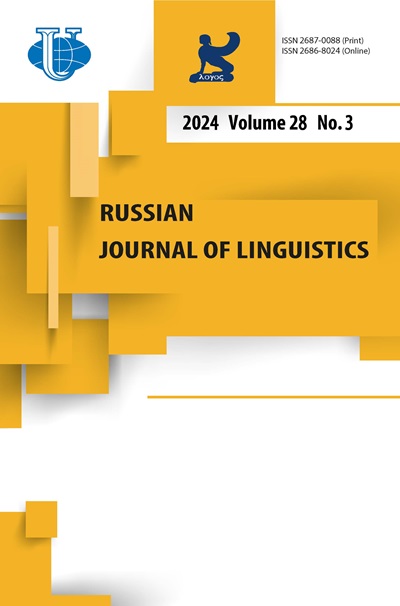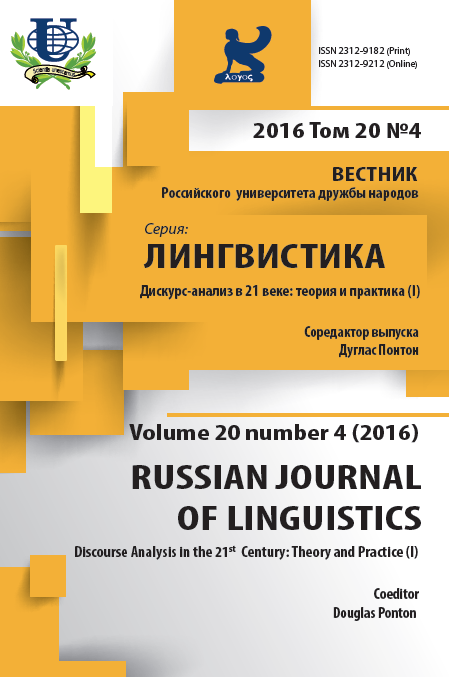Деструктивность в политическом дискурсе
- Авторы: Волкова Я.А.1, Панченко Н.Н.1
-
Учреждения:
- Волгоградский государственный социально-педагогический университет
- Выпуск: Том 20, № 4 (2016): Дискурс-анализ в 21 веке: теория и практика (I)
- Страницы: 161-178
- Раздел: Статьи
- URL: https://journals.rudn.ru/linguistics/article/view/15154
- DOI: https://doi.org/10.22363/2687-0088-15154
Цитировать
Полный текст
Аннотация
Деструктивность относится к числу фундаментальных дискурсивных категорий, которые играют значительную роль в организации коммуникативного взаимодействия и определяют прагматику дискурса; ее изучение способствует пониманию некоторых механизмов и принципов коммуникации, а также идентификации стратегий и тактик, используемых деструктивной коммуникативной личностью. Актуальность настоящего исследования определяется нарастающими проявлениями агрессивности в различных типах дискурса и, соответственно, необходимостью расширения знаний о деструктивном поведении коммуникативной личности. Исследование базируется на теории дискурс-анализа и теории деструктивности (Z. Harris, T. van Dijk, A. Buss, E. Fromm, D. Ponton, K. Hacker, R. Wodak, Н.Д. Арутюнова, В.И. Карасик, М.Л. Макаров, Е.И. Шейгал и др.). Развивая теорию деструктивности Э. Фромма (1973), авторы уточняют понятие деструктивности по отношению к политическому дискурсу и соотносят его с родственным понятием агрессивности. В статье на материале отрывков из выступлений кандидатов на пост президента 2016 г. анализируется категория деструктивности в современном политическом дискурсе США. Особое внимание уделяется доминирующей деструктивной интенции - нанести вред репутации оппонента и уменьшить его политические шансы, а также функциям вербальной агрессии: с одной стороны, дискредитировать оппонента, с другой, настроить аудиторию против него/нее и вызвать у аудитории ощущение опасности, исходящей от политического оппонента. Проводится анализ вербальных и невербальных средств выражения деструктивности в политическом дискурсе США. Делается вывод о том, что оскорбительные реплики политиков - результат не спонтанного эмоционального всплеска, а тщательно продуманной деструктивной стратегии, в которой агональная природа политического дискурса стимулирует использование средств инструментальной агрессии (Басс, 1971) ради борьбы за власть, понижения статуса оппонента и ухудшения его публичного имиджа.
Об авторах
Яна Александровна Волкова
Волгоградский государственный социально-педагогический университет
Email: yana.a.volkova@gmail.com
400066, Волгоград, Россия, пр. им. В.И. Ленина, д. 27
Надежда Николаевна Панченко
Волгоградский государственный социально-педагогический университет
Email: panchnn@yandex.ru
400066, Волгоград, Россия, пр. им. В.И. Ленина, д. 27
Список литературы
- Арутюнова Н.Д. Дискурс // Языкознание. Большой лингвистический словарь. М.: Большая Рос. энцикл., 1998. С. 136-137
- Будаев Э.В., Чудинов А.П. Зарубежная политическая лингвистика: учеб. пособие. М.: Флинта, Наука, 2008. [Электронный ресурс]. URL: http://profilib.com/chtenie/130642/anatoliy-chudinov-zarubezhnaya-politicheskaya-lingvistika-11.php (дата обращения: 15.08.2016)
- Волкова Я.А. Деструктивное общение в когнитивно-дискурсивном аспекте: монография. Волгоград: Перемена, 2014. 324 с
- Дейк Т.А. ван. Принципы критического анализа дискурса / пер. с англ. // Перевод и лингвистика текста. М.: ВЦП, 1994. С. 169-217
- Добреньков В.И. Психоаналитическая социология Эриха Фромма. М.: Альфа-М, 2006. 448 с
- Добросклонская Т.Г. Массмедийный дискурс в современной системе дискурсивных практик // Дискурс как социальная деятельность: приоритеты и перспективы. М.: ФГБОУ ВПО МГЛУ, 2014. С. 106-108
- Дубровская О.Н. Сложные речевые события и речевые жанры // Жанры речи: сб. науч. ст. Саратов: Изд-во Государственного учебно-научного центра «Колледж», 1999. С. 101-106
- Земская Е.А. Городская устная речь и задачи ее изучения // Разновидности городской устной речи. М.: Наука, 1988. С. 5-44
- Иссерс О.С. Коммуникативные стратегии и тактики русской речи. Омск, 1999. 284 с
- Карасик В.И. Языковой круг: личность, концепты, дискурс. Волгоград: Перемена, 2002. 477 с
- Куницына В.Н., Казаринова Н.В., Погольша В.М. Межличностное общение: учебник для вузов. СПб.: Питер, 2001. 544 с
- Леонтович О.А. Методы коммуникативных исследований. М.: Гнозис, 2011. 224 с
- Лысак И.В. Человек - разрушитель: деструктивная деятельность человека как социокультурный феномен. Таганрог: Изд-во ТРТУ, 1999. 55 с
- Макаров М.Л. Основы теории дискурса. М.: ИТДГК «Гнозис», 2003. 280 с
- Манаенко Г.Н. Мир текста и мир дискурса // Предложение и Слово: межвуз. сб. науч. тр. Саратов: Издательский центр «Наука», 2008. С. 325-331
- Панченко Н.Н. Достоверность как коммуникативная категория: монография. Волгоград: Перемена, 2010. 395 с
- Плотникова С.Н. Политик как конструктор дискурса реагирования // Под ред. В.Н. Базылева, В.Г. Красильниковой. Политический дискурс в России 8: Святые без житий: материалы постоянно действующего семинара. М.: МАКС Пресс, 2005. С. 22-26
- Фромм Э. Анатомия человеческой деструктивности. М.: Республика, 1994. 447 с
- Шейгал Е.И. Семиотика политического дискурса: монография. Волгоград: Перемена, 2000. 368 с
- Якимович Е.В. Лингвоаксиологический анализ дискурса // Под ред. Н.А. Красавского. Антропологическая лингвистика. Волгоград: «Колледж», 2007. Вып. 7. С. 3-11
- Buss, Arnold (1971). Aggression Pays. The Control of Aggression and Violence. NY, London. 18-35
- Chilton, Paul A. (1994). Politics and Language. In R.E. Asher (Ed.), The Encyclopedia of Language and Linguistics (pp. 3214-3221). Oxford, New York: Pergamon Press
- Dijk, van Teun A. (1972). Some aspects of text grammars. A Study in theoretical poetics and linguistics. The Hague: Mouton, 1972
- Grice, Paul H. (1975). Logic and Conversation. In P. Cole and J.L. Morgan Eds.), Syntax and Semantics (pp. 41-58). Vol. 3. New York: Academic Press
- Hacker, Kenneth L. (1996). Political Linguistic Discourse Analysis. The Theory and Practice of Political Communication Research. 28-55. NY: State University of New York Press
- Harris, Zellig S. (1952). Discourse Analysis: A Sample Text. Language. 474-494
- Hymes, Dell (1977). Foundations in Sociolinguistics. An Ethnographic Approach. London: Tavistok
- Ilie, Cornelia (2004). Insulting as (un)parliamentary practice in the British and Swedish parliaments: A rhetorical approach. In P. Bayley (Ed.), Cross-cultural Perspectives on Parliamentary Discourse (pp. 45-86). Amsterdam / Philadelphia: John Benjamins Publishing Company
- Ponton, Douglas M. (2010). The Female Political Leader: a Study of Gender-identity in the Case of Margaret Thatcher. Journal of Language and Politics, Vol. 9 (2), 195-218
- Weiss, Gilbert, Wodak, Ruth (2003). Introduction: Theory, Interdisciplinarity and Critical Discourse Analysis. In G. Weiss and R. Wodak (Eds), Critical Discourse Analysis: Theory and Interdisciplinarity (pp. 1-32). Palgrave Macmillan Ltd

















